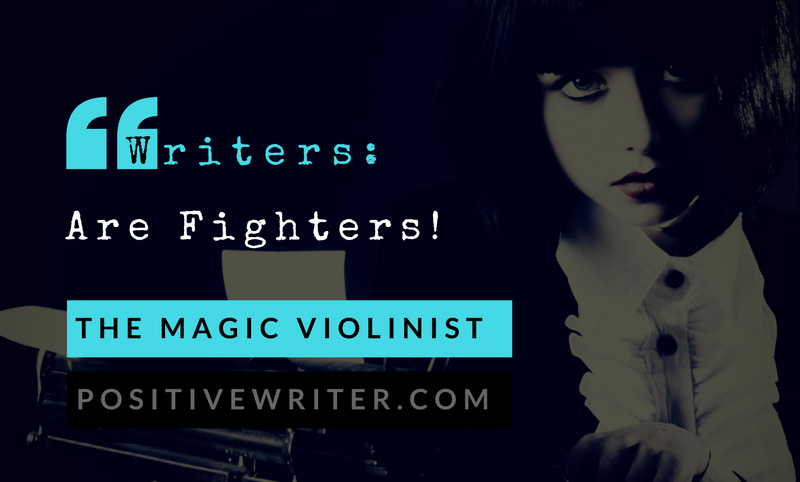Bad news first. It would be wonderful to say you can love to hate your inner editor, but really, we just have to hate to hate them. No matter how skilled we are as writers, no matter how much experience we’ve had, no matter anything, they will always be there on some level.
That’s the scary, hard truth. But there’s good news!

The good news is dealing with your inner editor doesn’t have to be so painful. You can learn to tune them out or, as I like to do, kill them with kindness. Your inner editor is within you. It is you, just twisted into someone that has no other hobby than to wrongfully belittle you and your work. It makes sense that the best solution to having to live with yourself is to, well, be kind to yourself.
I like to give my inner editor more of a life than this disembodied voice that gives me a headache. It makes them easier to picture, talk to, and confront. His name is Difficult Dan. He’s fond of red sweaters and chunky glasses and Chai tea. He’s also kind of scruffy and has been balding ever since I’ve known him.
Difficult Dan has always been loud and annoying, but he’s gotten quieter over the years. Every now and then he’ll pop up with some Starbucks and unsolicited words of unhelpful advice, usually when I’m already having a bad day. But I don’t have a lot of trouble shoving him back in his little box where he lives out his sad, lonely days. (Difficult Dan sometimes hangs Christmas lights in his box for the holidays, but that’s about as cheerful as he gets. It’s not that he’s forced to live in a box, even for Christmas. He just wants to for some strange, unknown reason.)
How do I get him to finally go away so I can get some writing done? I respond to his negative statements with something a little more positive. Everyone’s inner editor is different (they might be male or female, young or old, or maybe not even human), but they generally have something to say along these lines.
- “You’ll never be as good as [your favorite author].”
Positive response: “[Your favorite author] and I each have fantastic styles unique to ourselves.”
This leaves Difficult Dan speechless. He never saw it that way. That doesn’t mean he won’t forget what you said a week later, but it does the trick in the moment. Of course you won’t be the same as your favorite author. But that doesn’t mean you’re worse than them in any way. Writers are these amazing, talented, incredibly unique creatures. You have your own, beautiful style.
- “No one will want to read your book.”
Positive response: “I don’t have any control over who may or may not want to read my book, but I’ll find an audience who appreciates my work.”
Yes, some people won’t want to read your book. And that’s okay. Chances are, it’s not the book for them anyway. And they’re probably not the readers for you. Just like you and another person might not be compatible as friends or romantic partners or any acquaintance, really, it’s best not to force it. It’s better to surround yourself with people you work well with, and readers who appreciate your work.
- “You should write more.”
Positive response: “I’m doing my best and will continue to write in a way that makes me feel good about myself and my writing.”
As long as you’re doing the best by your writing and by yourself, who is Difficult Dan or any other inner editor to say that you should be doing more? How can you do more than your best? That’s absurd! If you feel good, shove Difficult Dan back in his box and put a lid on it.
- “This draft is crap.”
Positive response: “I can always edit what doesn’t work for me.”
Here’s a not-so-secret secret: everyone writes crap. Everyone. The best writers in the universe, the greatest poets and novelists that have written or have yet to write, all of them will write crap. It’s easy to think someone like J.K. Rowling or Victor Hugo never wrote crap, because you never see those drafts. You see the polished, glimmering version of those early stages. That draft you just wrote that you want to shove under a mattress or crumple up for the garbage can? That could be the early stage of Harry Potter or Les Misérables.
- “You should give up.”
Positive response: “I should fight through this and prove that I can overcome obstacles.”

Writers are fighters. (Click to Tweet)
We brandish our pens to slash our way through daily struggles like a knight might wave a sword at a dragon. If we gave up at the first sign of trouble, we would’ve stopped writing years ago. Don’t give Difficult Dan that sort of power. Believe me, it’ll only make him stronger and he’ll never let you live it down. Losers like him love to shove their victories in your face. You’re better than him.
- “Why can’t you think of anything to write?”
Positive response: “What’s blocking my creativity and how can I handle it?”
Difficult Dan’s question is a snide, rhetorical one. Combat it with one that’s being asked for the true sake of curiosity and helpful knowledge. If there’s a problem, find the root of it and make a logical progression to the solution. It might take a little digging, but it will be worth it.
- “You’re a terrible writer.”
Positive response: “No writer is perfect and I am always learning to be better than the writer I was yesterday.”
Petty insults. Is that all Difficult Dan has? It might seem strange that his strongest attack is actually the weakest one. This negative statement is nothing more than a few words worthy of an internet troll. And you know what they say, don’t feed the trolls. Realize that his argument is false, that you can only become better from here, and rise above. After all, it’s hard to take anything seriously from a guy who voluntarily lives in a box.
What does your inner editor look like? How can you respond positively to their negativity?
